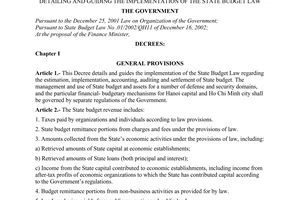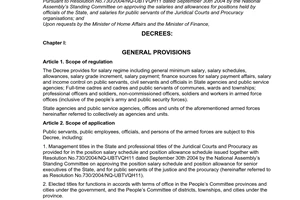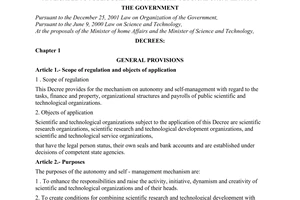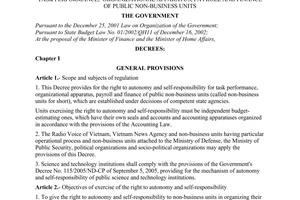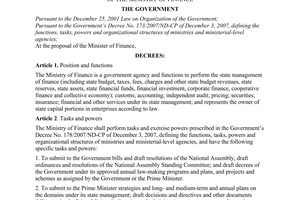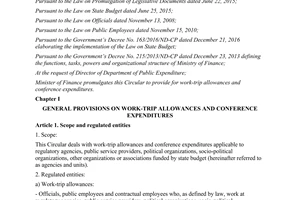Circular No. 97/2010/TT-BTC on work-trip allowances and conference expenditures đã được thay thế bởi Circular 40/2017/TT-BTC on work trip allowances and conference expenditures và được áp dụng kể từ ngày 01/07/2017.
Nội dung toàn văn Circular No. 97/2010/TT-BTC on work-trip allowances and conference expenditures
|
THE
MINISTRY OF FINANCE |
SOCIALIST
REPUBLIC OF VIET NAM |
|
No. 97/2010/TT-BTC |
Hanoi, July 06, 2010 |
CIRCULAR
ON WORK-TRIP ALLOWANCES AND CONFERENCE EXPENDITURES APPLICABLE TO STATE AGENCIES AND PUBLIC NON-BUSINESS UNITS
Pursuant to the Government's
Decree No. 60/ 2003/ND-CP of June 6, 2003, detailing and guiding the
implementation of the Law on the State Budget;
Pursuant to the Government's Decree No. 118/2008/ND-CP of November 27, 2008, defining
the functions, tasks, powers and organizational structure of the Ministry of
Finance;
In furtherance of the Political Bureau's Conclusion No. 40-KUTW of March 6,
2009, redressing irrationalities in salaries of and allowances for cadres,
civil servants and public employees within Party, State and Vietnam Fatherland
Front agencies, mass organizations and armed forces;
To practice thrift, combat waste and meet practical requirements, the Ministry
of Finance provides for work-trip allowances and conference expenditures
applicable to state agencies, public non-business units, sociopolitical
organizations, socio-political-professional organizations, social
organizations, socio-professional organizations and armed forces units funded
with the state budget (below referred to as agencies and units) as follows:
Part I
WORK-TRIP ALLOWANCES
Article 1. General provisions on work-trip allowances
1. Scope and beneficiaries of work-trip allowances:
Cadres, civil servants, public employees and contractual employees defined by law who work in agencies and units; officers and soldiers on termed service, workers, public employees and contractual employees in people's armed forces units (below referred to as cadres and civil servants) who are sent on domestic work trips by competent authorities; and deputies to People's Councils at all levels who participate in activities of People's Councils.
Cadres and civil servants who are invited by procedure-conducting agencies as witnesses in cases involving their expertise.
2. Work-trip allowances, which are expenses payable to those on domestic work trips, include travel expense, stay allowance, rent for lodgings in work-trip destinations, luggage charge, and document-carrying charge (if any).
3. Conditions for cadres and civil servants to receive work-trip allowances:
- They perform their assigned tasks;
- They are sent on work trips by heads of their agencies or units; or they are invited by procedure-conducting agencies as witnesses in cases involving their expertise;
- They have adequate supporting documents for payment under this Circular (except cases entitled to package payment).
4. The following cases are ineligible for work- trip allowances:
- Treatment or convalescence time at health establishments or sanatoria;
- Time at long- or short-term training courses during which trainees have enjoyed entitlements;
- Time for private business during work trips;
- Time on resident or dispatched assignment in another locality or agency under a decision of a competent authority.
5. Heads of agencies and units shall consider sending their staff on work trips (regarding the number and work-trip duration) efficiently and economically within their allocated annual state budget estimates.
6. Agencies and units shall pay allowances to their staff on work trips, except the case specified in Clause 6. Article 2 of this Circular.
7. During work trips, if work requires extra time, cadres or civil servants may, in addition to stay allowances, enjoy extra-time pay under current regulations. Heads of agencies and units shall specify in their internal spending regulations procedures for certification of extra working time as a basis for payment and work trips eligible for extra-time pay, on the principle that payment may be made only in case such extra working time is required by a competent authority, not for cases in which cadres or civil servants on work trips concurrently settle their personal matters during days-off.
Article 2. Contents and levels of spending on work-trip allowances
1. Payment of travel expenses:
a/ Those on work trips may receive travel expenses they have paid, including rent for vehicles from their homes to airports, railway stations or car terminals and vice versa; airfares, train tickets or tickets of mass transit vehicles from their agencies to work-trip destinations and vice versa; expense for travel within localities of work-trip destinations, such as from lodgings to workplaces, from airports, railway stations or car terminals to lodgings and vice versa; charge for ferry boats for themselves and vehicles; road toll and document-carrying charge (if any). In case sending and receiving agencies or units have arranged vehicles for cadres and civil servants, they will not have such expenses paid.
Documents for and levels of payment are based on prices indicated in tickets, ticketing invoices or receipts of vehicle owners. The ticket price is exclusive of other service charges like those for sightseeing or special services on request. Particularly for documents for payment of airfares, boarding cards are required in addition to ticket counterfoils (or electronic tickets).
b/ Based on agencies' or units' internal spending regulations, the nature of work trips and allocated funds, heads of agencies or units shall approve cadres' or civil servants' request for payment of expenses for travel by air. train, car or rudimentary vehicles, ensuring thrift and efficiency.
c/ Regulations on airfares for persons on domestic work trips:
- For high-ranking leaders (holding titles higher than ministerial level or equivalent), state current regulations apply;
- Business-class or class-C airfares are applicable to leading officials who enjoy salaries for leadership posts or enjoy leadership post-based allowances under the National Assembly Standing Committee's Resolution No. 730/NQ-UBTVQH of September 30, 2004. the Party Central Committee Secretariat's Decision No. 128-QD-TW of December 14. 2004. or the Government's Decree No. 204/2004/ND-CP of December 14. 2004, including ministers and equivalent: deputy ministers and leading officials who enjoy post-based allowance coefficient of 1.3 or higher; deputy heads of central socio-political organizations; and the Standing Secretary of the central Ho Chi Minh Communist Youth Union;
- Economy-class airfares are applicable to cadres and civil servants holding other titles.
d/ For regions in which vehicles of mass transit dealers are unavailable and those on work trips have to hire other vehicles, heads of their agencies or units shall decide to approve payment of vehicle rents based on vehicle rent contracts or receipts of vehicle owners (taking into account freights of other vehicles at the same time in these regions).
2. Package payment of car rents:
a/ Leading officials who are entitled to cars arranged under the Prime Minister's regulations but have to pay car rents themselves because their agencies or units cannot arrange cars for them when they go to localities 10 km or more (in highland, island, difficulty-hit mountainous or deep-lying areas) or 15 km or more (in other areas) away from their working offices are entitled to package payment of car rents by their agencies or units, based on the actual distance (kilometer) and rent rate, Heads of agencies or units shall set rent rates based on popular rent rates applicable to medium-grade vehicles in localities and include such rent rates in their internal spending regulations.
b/ Cadres and civil servants who are not entitled to be arranged cars and who go on work trips on their own cars to localities 10 km or more (in highland, island, difficulty-hit mountainous or deep-lying areas) or 15 km or more (in other areas) away from their working offices are entitled to package payment of car rents based on the actual distance (kilometer) multiplied by the presumptive rent rate (including fuel cost and car depreciation).
c/ Bases for package payment of car rents include a travel warrant of cadres or civil servants on work trips, certified by the receiving agency (or hotel or guesthouse), and a table listing travel distances, which shall be submitted to heads of agencies or units for payment approval and included in internal spending regulations of agencies or units.
3. Stay allowances:
a/ Stay allowances mean amounts paid by agencies or units to their staff on work trips in addition to their salaries, to ensure meal expenses and pocket money for them, for a period from the date they begin until they finish their work trips and return to their agencies or units (including time of journey and stay in work-trip destinations).
The stay allowance payable to a cadre or civil servant on a work trip must not exceed VND 150.000/day. For a work trip within a day. the head of an agency or unit shall decide on the level of stay allowance based on the actual number of hours of the work trip, the work time outside working hours (including the time of journey) and the distance from the agency or unit to the work-trip destination, which must be included it in internal spending regulations of the agency or unit.
b/ Cadres and civil servants working on the mainland who are sent on work trips at sea or on islands are entitled to the maximum stay allowance of VND 200.000/person/day of actual work trip (applicable to days during which they work on islands and travel days at sea). In specific sectors for which allowances for work trips at sea or on islands have been stipulated by competent authorities, the highest allowance level may be applied to payment to cadres and civil servants.
c/ Supporting documents for payment of stay allowances include a document or work plan approved by the head of an agency or unit; and a travel warrant appended with the seal of the sending agency or unit and signed by and appended with the seal of the receiving agency (or hotel or guesthouse) certifying dates of arrival and departure.
4. Payment of rents for lodgings in work-trip destinations:
For high-ranking leaders, current state regulations apply; Other cadres and civil servants may have lodging rents paid by their agencies or units by:
a/ Package payment:
- For work trips to urban districts of Hanoi, Ho Chi Minh, Hai Phong, Can Tho and Da Nang cities, and provincial grade-I urban centers, the package allowance must not exceed VND 350,000/day/person;
- For work trips to rural districts of centrally run cities and other towns and provincial cities, the package allowance must not exceed VND 250,000/day/person;
- For work trips to other areas, the package allowance must not exceed VND 200,000/day/person:
- For holders of ministerial, deputy- ministerial or other equivalent titles who receive package payment, the package allowance must not exceed VND 900,000/day/person. regardless of their work-trip destinations.
Cadres on work trips who have to complete their tasks until the day-end or who can buy airfares, train or car tickets only from 18:00 hours to 24:00 hours of the same day may receive payment for an additional half-a-day rent not exceeding 50% of the relevant package level of lodging rent.
b/ Invoice-based payment:
Cadres or civil servants on work trips who refuse to receive package payment under Point a above may receive payment based on actual lodging rents (accompanied with lawful invoices) as approved by heads of their agencies or units, specifically as follows:
- Holders of ministerial or equivalent titles are entitled to the lodging rent not exceeding VND 2.5 million/day/room;
- For work trips to urban districts of Hanoi. Ho Chi Minh, Hai Phong, Can Tho and Da Nang cities, and provincial grade-I urban centers:
+ Leaders who enjoy a post-based allowance coefficient of 1.25-1.3 in administrative agencies or non-business units and holders of equivalent titles in Party or Vietnam Fatherland Front agencies or mass organizations arc entitled to the lodging rent not exceeding VND 1.2 million/day/ room;
+ Other cadres and civil servants are entitled to the lodging rent not exceeding VND 0.9 million/day/room with 2 persons/room;
- For work trips to other areas:
+ Leaders who enjoy a post-based allowance coefficient of 1.25-1.3 in administrative agencies or non-business units and holders of equivalent titles in Party or Vietnam Fatherland Front agencies or mass organizations are entitled to the lodging rent not exceeding VND 1 million/day/ room;
+ Other cadres and civil servants arc entitled to the lodging rent not exceeding VND 0.6 million/day/room with 2 persons/room;
- A cadre or civil servant who goes on a work trip alone or odd persons or odd persons of different sexes in a delegation (for other cadres and civil servants) may rent a separate room at the actual rent rate not exceeding the rent applicable to other cadres or civil servants in the delegation (with 2 persons/room);
- Cadres and civil servants on work trips in the same delegations with holders of leading titles who are entitled to hotel room norms higher than those for such cadres and civil servants may receive payments based on actual rents of standard rooms in hotels in which such holders of leading titles stay with 2 persons/room.
c/ Supporting documents for payment of lodging rents include a document or work plan indicating the number of work-trip days approved by the head of an agency or unit; a travel warrant appended with the sending agency's or unit's seal and signed by and appended with the seal of the receiving agency (or hotel or guesthouse) certifying the dates of arrival and departure and a lawful invoice (in case payment is made based on actual lodging rents).
d/ Cadres and civil servants on work trips to agencies or units that have arranged free lodgings are not entitled to package payment of lodging rents. If requesting and receiving package payment of lodging rents, they shall refund the rents to their agencies or units and be disciplined under the law on cadres and civil servants.
5. Package payment of monthly work-trip allowances:
For commune-level cadres and cadres of other agencies or units who have to regularly go on work trips for over 10 days a month (such as correspondence clerks, accountants, forest rangers, officers of procedural agencies who conduct investigation, procuracy or verification or send legal notices), heads of agencies or units shall, depending on entities, task characteristics and financial capacity, set the package level of monthly work-trip allowance to support these cadres and civil servants in covering car-parking and fuel expenses, which must not exceed VND 300,000/person/month and shall be included in their internal spending regulations.
These cadres who are sent by competent authorities to go on specific work trips may receive payments for travel expenses and stay allowances under Clauses 1, 2 and 3 of this Article together with monthly package work-trip allowances if they go on work trips for over 10 days a month.
6. For cadres and civil servants going on work trips with inter-branch or -agency delegations
a/ In case an agency or unit wishes to requisition cadres, civil servants and public employees of another agency or unit for an inter-branch work trip to perform its political tasks or for fundamental research projects, that agency or unit shall pay all expenses for the delegation, including travel expenses, luggage charge, document-carrying charge, stay allowance, and lodging rent in work-trip destinations at the levels specified in its internal spending regulations.
b/ In case cadres and civil servants join an inter-branch or -agency delegation on a work trip under the requisition of a superior state management agency or coordinate with one another in performing jobs within political tasks of each agency or unit, the agency or unit in charge of the delegation shall pay travel expenses, luggage charge, and document-carrying charge (if any) to these cadres and civil servants. A delegation member who goes to the work-trip destination alone may have travel expenses, luggage charge, and document-carrying charge (if any) paid by his/her agency or unit.
In addition, the sending agency or unit shall pay stay allowances and lodging rents to their staff on work trips.
c/ Payment documents: In addition to the documents specified in Clauses 1.2 and 3, Article 2, there must be official letters (letters or official letters of invitation) requisitioning cadres, civil servants and public employees of other agencies or units for work trips. Such an official letter must indicate each agency's and unit's responsibility to pay work-trip expenses.
7. Deputies to People's Councils at all levels on work trips to perform their tasks (attending meetings of People's Councils or of committees of People's Councils, conducting supervisory activities or meeting with voters) may receive payments for work-trip allowances from operating funds of People's Councils.
8. Cadres and civil servants who are invited by procedure-conducting agencies as witnesses in cases involving their expertise may receive payments for work-trip allowances from operating funds of these agencies.
Part II
CONFERENCE EXPENDITURES
Article 3. General provisions on conference expenditures
1. Subjects and scope of application:
Conference expenditures under this Circular are applicable to thematic review conferences, annual review conferences, and task performance training conferences held by state administrative agencies as prescribed in the Prime Minister's Decision No. 114/2006/QD-TTg of May 25. 2006. promulgating regulations on meetings in the operation of state administrative agencies.
Sessions of People's Councils and their standing boards and committees, socio-political organizations, socio-political-professional organizations, social organizations, socio-professional organizations and public non-business units funded with the state budget must comply with regulations on conference expenditures under this Circular.
Particularly, the National Congress of the Communist Party of Vietnam, congresses of Party committees at all levels in preparation for the National Congress, conferences of Party agencies, National Assembly sessions, sessions of the Ethnic Council or other committees of the National Assembly, and sessions of the National Assembly Standing Committee must comply with specific regulations of competent authorities.
2. Before holding conferences to grasp and implement nationwide the Party's and State's major, important and urgent guidelines and policies in their assigned management domains; thematic review conferences; or conferences reviewing annual work programs, ministries, ministerial-level agencies or government-attached agencies shall obtain the Prime Minister's written approval under the Prime Minister's Decision No. 114/2006/QD-TTg of May 25, 2006, promulgating regulations on meetings in the operation of state administrative agencies. Before organizing national conferences, the Party's central committees shall obtain written approval of the Secretariat's Standing Committee.
Before convening the whole sector's meetings in localities to review the performance of annual tasks or training meetings attended by chairpersons or vice chairpersons of district-level People's Committees or heads of other district-level specialized agencies, heads of specialized agencies of provincial-level People's Committees shall obtain approval of chairpersons of provincial-level People's Committees under regulations.
Before convening the whole sector's meetings in districts to review the performance of annual tasks or training meetings attended by chair-persons or vice chairpersons of commune-level People's Committees or heads of other commune-level specialized agencies, heads of specialized agencies of district-level People's Committees shall obtain approval of chairpersons of district-level People's Committees under regulations.
3. When holding conferences, heads of concerned agencies or units shall arrange appropriate locations and increase online meetings, especially for national conferences, while meeting specific requirements of each conference; combine matters and problems to be addressed; rationally combine different meetings; make careful preparations for meetings. Depending on characteristics, contents, purposes and requirements of a meeting, the person convening the meeting shall carefully consider and decide on the appropriate composition and number of participants, ensuring thrift and efficiency.
Conference organizers shall comply with regulations on conference expenditures under this Circular, preventing ostentation. They may not hold reception parties or pay for sightseeing activities, presents or souvenirs and restrict hiring art performances. Funds for conferences shall be included in agencies' or units' annual state budget estimates approved by competent authorities.
Conference organizers shall provide conference delegates with convenient accommodations.
Deputies to People's Councils at all levels and deputies invited by standing boards of People's Councils at all levels to attend sessions or meetings of committees of People's Councils may receive payments for work-trip allowances from operating funds of People's Councils.
4. The duration of a conference complies with the Prime Minister's Decision No. 114/2006/QD-TTg of May 25. 2006, promulgating regulations on meetings in the operation of state administrative agencies, which must:
- Not exceed one day. for annual review conferences;
- Be 1 -2 days, for thematic review meetings, depending on the theme characteristics and contents;
- Be 1-3 days, for task performance training meetings, depending on characteristics and contents of concerned issues;
The duration of a training course with funds for training and retraining state cadres and civil servants or funds under programs or projects depends on the training program approved by a competent authority;
- Not exceed 2 days, for other meetings, depending on their characteristics and contents.
- The duration of a session of People's Councils or a meeting of committees of People's Councils is not regulated by this Circular.
Article 4. Spending contents and levels for conferences
1. The conference organizer may pay for the following:
a/ Rents for meeting halls during conference days (in case the organizer has no venue or a venue is not large enough); projectors and equipment for the conference.
b/ Documents; pens and paper (if any) for participants; hiring of lecturers; allowances for rapporteurs.
c/ Rents of vehicles for transporting delegates from their lodgings to the conference venue, in case the organizer has no vehicles or not enough vehicles.
d/ Drinks during the conference.
e/ Supports for meal, lodging and travel expenses for guest delegates who are not salaried by the state budget.
An additional amount shall be paid for the difference (between the actual expense for meals provided to all delegates and the amount already deducted from work-trip allowance) for state budget-salaried delegates and delegates of public non-business units (including non-business units that wholly or partly self-finance their operating expenses) and delegates of enterprises.
f/ Other expenses for extra-time work, ordinary curative medicines or decoration of meeting halls, etc.
Reward expenses at annual review meetings and expenses for public information work shall not be included in conference expenditures but in the organizer's commendation and public information expenses.
2. Specific spending levels:
a/ Support for meal expense for guest delegates who are not salaried by the state budget, which must not exceed:
- VND 150.000/day/person, for meetings held in inner areas of centrally run cities;
- VND 100,000/day/person, for meetings held in inner areas of provincial cities or in rural districts and towns of provinces;
- VND 60.000/day/person, for meetings held by administrations of communes, wards or townships (regardless of meeting venues).
The above support for meal expense serves as a basis for provision of package supports in cash to guest delegates who are not salaried by the state budget. In cases of providing meals to all delegates while the above package sum is insufficient, the head of the conference organizer shall, based on the characteristics of each conference and allocated state budget funds, decide on a higher level of support for meal expense for guest delegates, which must not exceed 130% of this package sum. The organizer shall deduct the meal expense from the work-trip allowance of state budget-salaried delegates at a level not exceeding the stay allowance specified in its internal spending regulations and may offset the difference between the actual expense for meals provided to all delegates and the amount already deducted from the work-trip allowance of state budget-salaried delegates, delegates from public non-business units or delegates from enterprises.
b/ Support for lodging rents for guests not salaried by the state budget shall be paid at the package payment level or real invoice as stipulated in Clause 4, Article 2 of this Circular.
c/ Allowances for lecturers and rapporteurs at professional training meetings and courses to disseminate and implement the Party's and State's mechanisms and policies; and allowances for reports presented at conferences shall be paid at the levels specified in the Finance Ministry's current regulations on management and use of funds for training and retraining state cadres and civil servants.
d/ Expense for drinks during a conference must not exceed VND 30,000/day (2 sessions)/ delegate.
e/ Support for travel expense for guest delegates not salaried by the state budget shall be paid under regulations on payment of work-trip allowances specified in this Circular.
f/ Other expenses for hiring meeting halls, vehicles or lecturers and copying documents, which must be accompanied by contracts, receipts or invoices (in case of hiring services).
Part III
ORGANIZATION OF IMPLEMENTATION
Article 5. Implementation responsibility
1. Funds used for payment of work-trip allowances and conference expenditures shall be managed and used according to norms, criteria and regulations issued by competent state agencies and within allocated annual state budget spending estimates.
2. Based on the state budget capacity and actual prices, ministers, heads of ministerial-level agencies or government-attached agencies shall specify levels of work-trip allowances and conference expenditures for their attached agencies and units. Provincial-level People's Committees shall submit to provincial-level People's Councils for stipulation appropriate levels of work-trip allowances and conference expenditures for local agencies and units, which must not exceed 20% of the maximum spending level specified in this Circular, and shall include them in regular spending estimates allocated at the beginning of a year for implementation.
In case no specific spending levels are issued by ministries, branches and localities, heads of agencies and units shall, based on the maximum spending level specified in this Circular, decide on actual spending levels (accompanied by lawful and valid invoices) not higher than the spending level, ensuring thrift and preventing waste within their allocated state budget estimates. These spending levels must be included in their internal spending regulations.
3. In special cases which require work-trip allowances and conference expenditures higher than the levels specified in this Circular, heads of agencies or units shall make consideration and decision on a case-by-case basis and take responsibility for their decisions. They shall publicize at the year-end such special cases in their agencies and use their regular spending estimates allocated at the beginning of a year for implementation.
4. Provincial-level People's Councils shall, pursuant to the National Assembly Standing Committee's Resolution No. 773/2009/NQ-UBTVQH12 of March 31, 2009. on spending for the operation of the National Assembly, National Assembly agencies, the National Assembly Office, agencies attached to the National Assembly Standing Committee, delegations of National Assembly deputies and National Assembly deputies, promulgate a resolution applicable to People's Councils at all levels to suit local situation, ensuring practical and effective operation of People's Councils at all levels with regard to relevant spending tasks.
5. The Ministry of Public Security and the Ministry of National Defense shall guide their attached agencies and units in implementing regulations on work-trip allowances and conference expenditures to suit their specific characteristics.
6. Public non-business units that wholly or partly self-finance their operating funds under the Government's Decree No. 43/2006/ND-CP of April 25, 2006, providing for the autonomy and accountability for task performance, organizational apparatus, payroll and finance for public non-business units; and public science and technology organizations that have implemented autonomy and accountability mechanisms under the Government's Decree No. 115/2005/ND-CP of September 5, 2005, may decide on the levels of work-trip allowances and conference expenditures different from the levels specified by ministers, heads of ministerial-level agencies or government-attached agencies or provincial-level People's Committees under this Circular, which shall be included in their internal spending regulations, ensuring thrift, efficiency and suitability with their state budget capacity and operation characteristics. For irregular expenditures (non-package funds), work-trip allowances and conference expenditures shall be paid at the levels specified by ministries, branches and localities under this Circular.
Conferences funded by organizations and individuals are encouraged to apply this Circular to ensure thrift and efficiency and suitability to the state budget capacity of concerned units.
State enterprises may apply regulations on work-trip allowances and conference expenditures under this Circular to ensure thrift, efficiency and suitability to their production and business characteristics. State enterprises allocated with state budget funds for implementation of specific programs or projects which require payment of work-trip allowances or conference expenditures shall pay such allowances or expenditures at the levels specified by competent authorities under approved programs or projects.
7. For work-trip allowances or conference expenditures which are detected through inspection as contrary to this Circular, superior managing agencies, finance agencies at all levels, inspectorates and stale audit offices may cancel their payment and request responsible agencies or units to recover and remit them into public funds. Makers of improper payment orders shall compensate the improperly paid sums to concerned agencies or units and shall, depending on the severity of their violations, be handled under current regulations.
Article 6. Organization of implementation
1. This Circular takes effect 45 days from the date of its signing and supersedes the Finance Ministry's Circular No. 23/2007/TT-BTC of March 21, 2007, on work-trip allowances and conference expenditures applicable to state agencies and public non-business units; Section I of the Finance Ministry's Circular No. 127/ 2007/TT-BTC of October 31, 2007, amending and supplementing Circular No. 23/2007/TT-BTC of March 21, 2007, and Circular No. 57/ 2007/TT-BTC of June 11, 2007; and Article 1 of the Finance Ministry's Circular No. 142/2009/ TT-BTC of July 14, 2009, amending and supplementing Circular No. 23/2007/TT-BTC and Circular No. 91/2005/TT-BTC of October 18,2005, on work-trip allowances for state cadres and civil servants on short-term overseas work trips funded with the state budget.
Particularly in 2010. agencies and units shall pay work-trip allowances and conference expenditures from their allocated state budget estimates and other lawful funding sources under this Circular.
2. Any problems arising in the course of implementation should be reported to the Ministry of Finance for guidance.-
|
|
FOR
THE MINISTER OF FINANCE |
